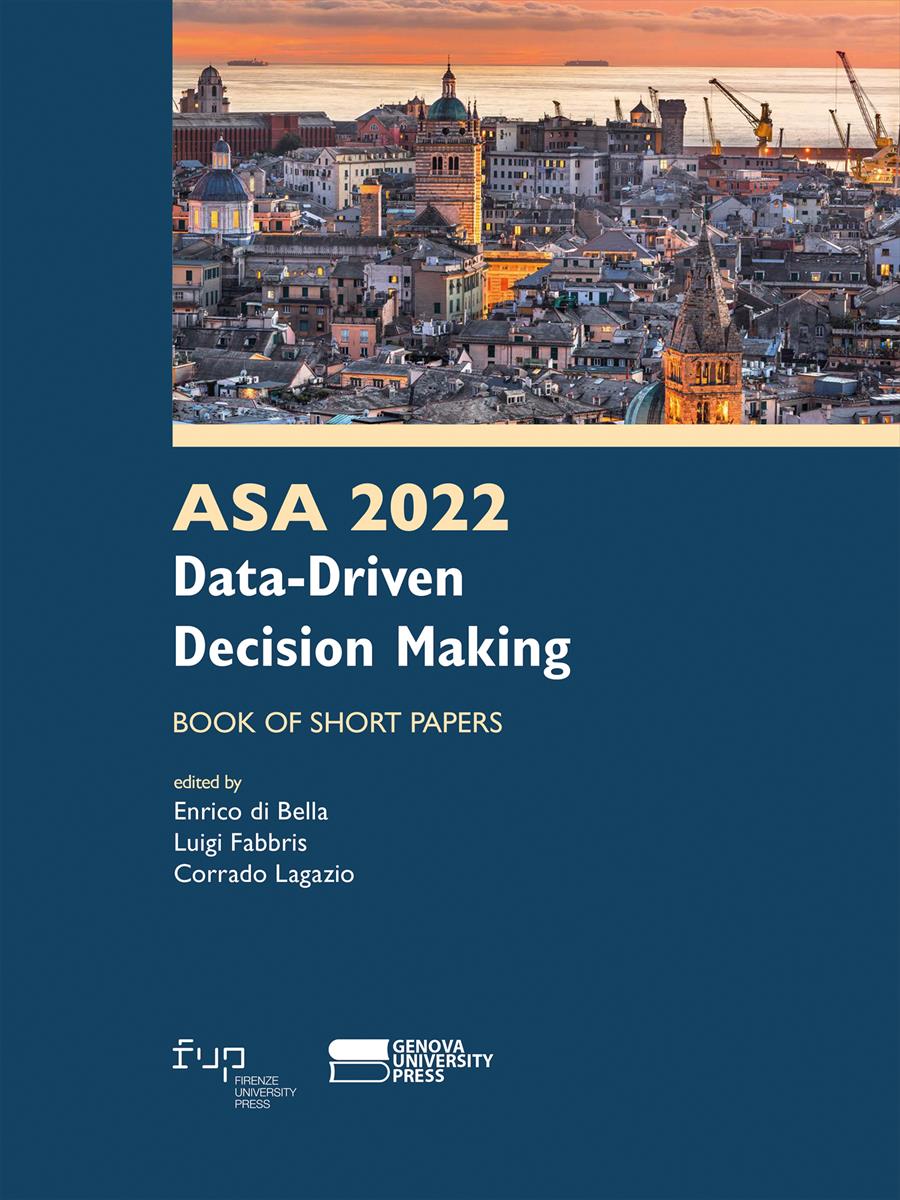- ASA 2022 Data-Driven Decision Making
- Edited by Enrico di Bella, Luigi Fabbris, Corrado Lagazio
Monitoring and evaluation of gender equality policies
- Giuliana Coccia
- Emanuela Scavalli
- © 2023 Author(s) |
- CC BY 4.0
- DOI: 10.36253/979-12-215-0106-3.48
The 2030 Agenda has been adopted to achieve a better and sustainable future for all. The process of approaching its 17 Sustainable Development Goals is monitored through a global system of 240 statistical indicators approved in March 2016 by the United Nations Statistical Commission. Sustainable Development Goal 5 seeks to achieve gender equality and empowerment all women and girls: it is broken down into 9 targets. According to these targets, indicators are being established for monitoring and evaluating progress on SDG in order to ensure high transparency and accountability within the 2030 Agenda. A gender equality plan will typically address several issues at once, leading to a complex set of measures. Nonetheless, effective monitoring and evaluation instruments are often lacking, which undermines the transformative potential of the planned measures. If objectives are not indexed on relevant progress, success or outreach indicators, it is difficult to assess whether the organisation is actually being transformed. Monitoring and evaluation are critical for building a strong, global evidence base around gender equality and for assessing the wide, diverse range of interventions being implemented to address it. Policy makers need support now if they are to use SDG evaluation as an opportunity to improve policies and programmes closer to home, applying tailored approaches. This paper deals with monitoring and evaluation of Goal 5 in Italy. In the context of the SDGs, evaluation relates to determining the merit, worth, significance and sustainability of strategies, policies and programmes that contribute to the achievement of the SDGs at national and territorial level. After analyzing the indicators available for the monitoring of the Goal 5, the benefits and limits that still exist for a full representation of gender equality will be explained.
- Keywords:
- Sustainable Development Goal,
- gender equality,
- composite indicator,
ASviS - Alleanza per lo Sviluppo Sostenibile, Italy
ISTAT, Italian National Institute of Statistics, Italy
- Cavalli, L., Lizzi, G., Toraldo, S. (2020). L’Agenda 2030 in Italia a cinque anni dalla sua adozione: una review quantitativa, Fondazione Eni Enrico Mattei Report N.12
- Gennari, F., (2015). L’uguaglianza di genere negli organi di corporate governance. Franco Angeli, Milano
- Gennari, P., D’Orazio, M.(2020). A statistical approach for assessing progress towards the SDG targets, Statistical Journal of the IAOS, vol. 36, no. 4, pp. 1129-1142.
- Richiedei, A., Pezzagno, M. (2022). Territorializing and Monitoring of Sustainable Development Goals in Italy: An Overview. Sustainability 2022, 14(5), 3056
- United Nations (2017). Resolution adopted by the General Assembly on 6 July 2017. A/RES/71/313
Chapter Information
Chapter Title
Monitoring and evaluation of gender equality policies
Authors
Giuliana Coccia, Emanuela Scavalli
Language
English
DOI
10.36253/979-12-215-0106-3.48
Peer Reviewed
Publication Year
2023
Copyright Information
© 2023 Author(s)
Content License
Metadata License
Bibliographic Information
Book Title
ASA 2022 Data-Driven Decision Making
Book Subtitle
Book of short papers
Editors
Enrico di Bella, Luigi Fabbris, Corrado Lagazio
Peer Reviewed
Publication Year
2023
Copyright Information
© 2023 Author(s)
Content License
Metadata License
Publisher Name
Firenze University Press, Genova University Press
DOI
10.36253/979-12-215-0106-3
eISBN (pdf)
979-12-215-0106-3
eISBN (xml)
979-12-215-0107-0
Series Title
Proceedings e report
Series ISSN
2704-601X
Series E-ISSN
2704-5846
